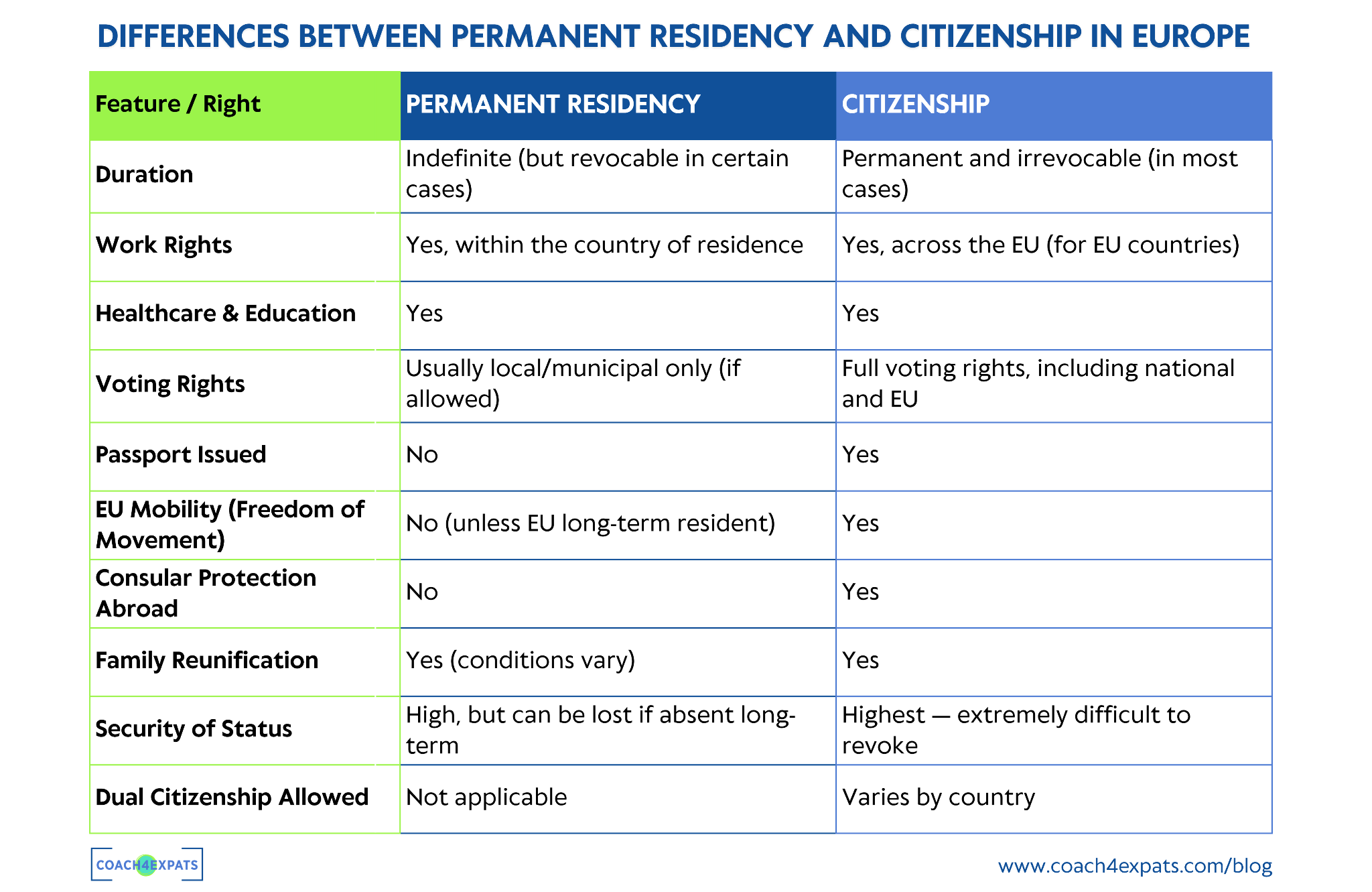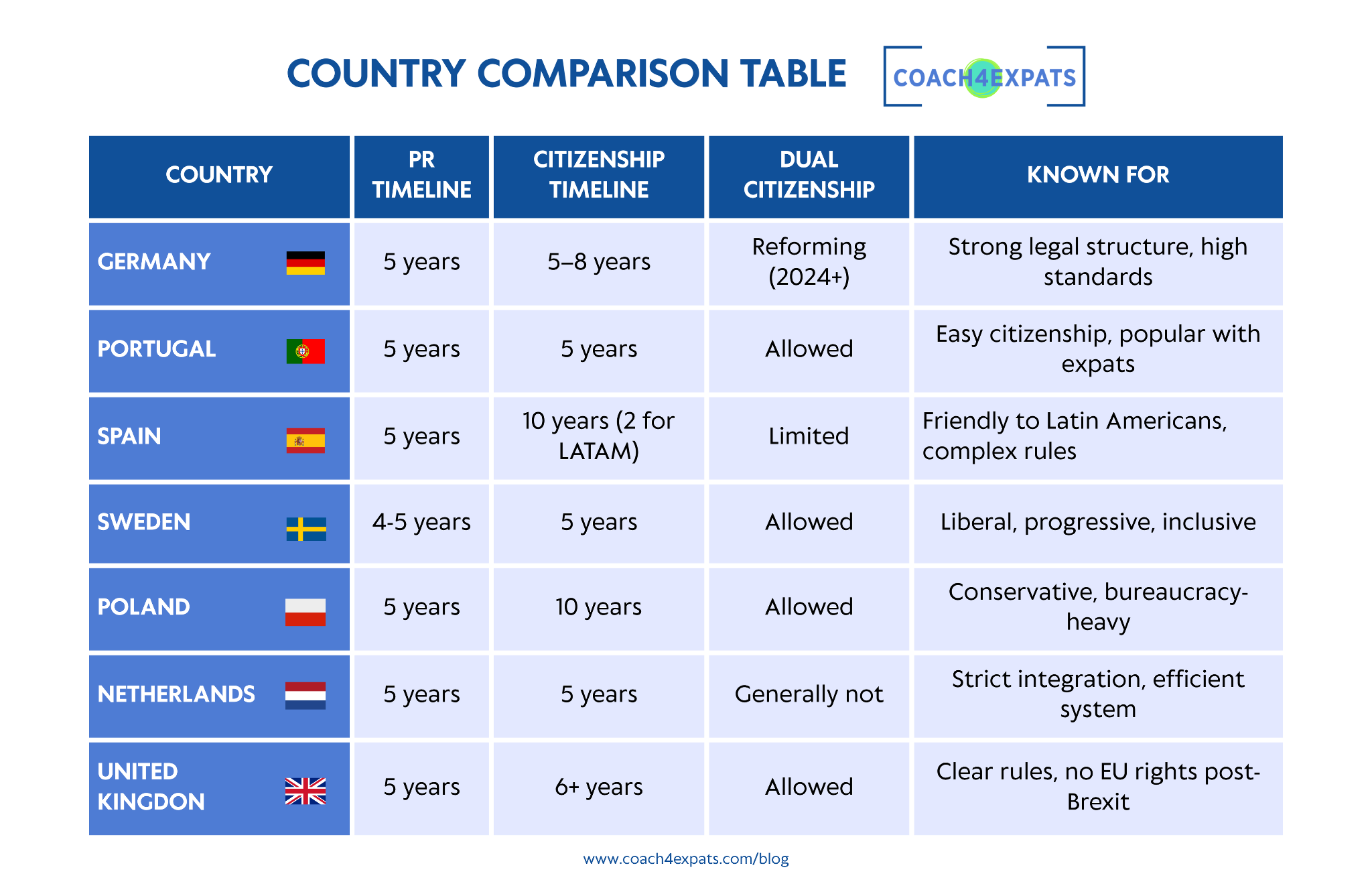Permanent Residency vs Citizenship in Europe: What Expats Should Know

Europe continues to attract people from around the globe who are seeking new opportunities, a higher quality of life, or simply a change of pace. Whether you’re a tech professional relocating to Berlin, a retiree settling in Portugal, or a student starting your journey in France, the question of long-term legal status inevitably comes up.
For many expats who have already spent several years in Europe, the next logical step is choosing between permanent residency and citizenship. Both options offer security and stability, but they differ in significant ways that can impact your rights, obligations, and freedom of movement within the EU.
Understanding these differences is crucial, not just from a legal standpoint, but also in terms of planning your future. Permanent residency may grant you the right to live and work in a country indefinitely, but it doesn’t always mean full integration into that country’s political or legal systems. Citizenship, on the other hand, often comes with broader rights and responsibilities, but typically requires a longer process and, in some cases, the renunciation of your original nationality.
In this article, Coach4expats breaks down the key distinctions between permanent residency and citizenship in Europe, highlights how the rules vary from one country to another, and offers practical guidance to help expats make informed decisions about their long-term future in the region.
Definitions and key differences
Understanding the distinction between permanent residency and citizenship is essential for any expat planning a long-term stay in Europe. Though both statuses offer a more secure footing than temporary residence permits, they come with different rights, responsibilities, and implications (both practical and legal).
a. What is permanent residency?
Permanent residency (PR) is a legal status that allows a non-EU citizen to live, work, and access public services in a European country indefinitely without being a citizen of that country. PR is typically granted after a continuous period of legal residence, and while it provides a stable and long-term foundation for life in Europe, it stops short of the full rights enjoyed by citizens.
General rights granted:
The right to live and work in the host country without time restrictions.
Access to public healthcare and education.
The ability to sponsor family members (subject to national rules).
Protection against deportation under most circumstances.
However, permanent residents generally do not have the right to vote in national elections, do not receive a passport from the host country, and do not automatically gain freedom of movement across the EU—unless they obtain EU long-term resident status, which is recognized in select member states and comes with additional requirements.
Common requirements across the EU:
– 5 years of continuous legal residence.
– Proof of stable income and accommodation.
– No serious criminal record.
– Language proficiency (A2–B1 level, depending on country).
– Integration measures, such as civic knowledge or cultural orientation tests.
b. What is citizenship?
Citizenship goes a step further than permanent residency, offering full membership in the national community. It allows an individual to hold a passport, vote in all elections, and enjoy full rights of movement and residence throughout the European Union (in the case of EU countries).
What citizenship entails:
The right to vote and run for public office.
An EU passport (for EU countries), enabling visa-free travel and consular support globally.
Full access to public benefits, including unemployment, pensions, and scholarships.
Greater legal protections, including protection from expulsion or deportation.
Citizenship also comes with responsibilities, such as jury duty, tax obligations (including global income in some countries), and, in rare cases, military service.
Pathways to obtain citizenship:
– Naturalization – Typically requires 5–10 years of continuous residence, language proficiency, integration tests, and clean criminal record.
– Descent – If you have a parent or grandparent from a European country, you may qualify through ancestry.
– Marriage to a Citizen – Often reduces the required residency period.
– Exceptional Contributions – For investors, athletes, artists, or individuals offering economic or cultural value (e.g., Malta’s citizenship-by-investment scheme).

Rights and benefits: PR vs Citizenship
1. Work and study
Citizenship provides full freedom to live, work, and study across all EU countries. In contrast, permanent residency typically grants these rights only within the issuing country, unless the individual holds EU long-term resident status, which allows limited intra-EU mobility but still doesn’t match the full scope of citizenship.
2. Mobility and travel
Citizens can travel freely across the EU and benefit from consular protection and visa-free access to many countries worldwide through an EU passport. Permanent residents, however, are usually tied to the Schengen Area for short stays and must comply with visa rules when entering other EU states for longer-term stays or relocation.
3. Political participation
Permanent residents may have the right to vote in local or municipal elections, depending on the country, but cannot vote in national or EU Parliament elections. Citizenship, on the other hand, grants full political rights, including the ability to vote and run for office at all levels.
4. Access to public services and benefits
Both PR holders and citizens typically have access to healthcare, education, and social services. However, some countries reserve full benefits (like certain pensions, unemployment schemes, or scholarships) for citizens or those with longer periods of contribution, making citizenship more advantageous in the long run.
Legal and practical considerations
– Duration and renewal. Permanent residency is usually indefinite but conditional residents may lose status after prolonged absence, or if they fail to meet criteria like income or integration. Citizenship is permanent and secure, rarely revoked except in extreme cases like fraud.
– Dual citizenship. Rules on dual citizenship vary widely across Europe. Countries like France, Ireland, and Sweden allow it, while others like Austria and the Netherlands impose restrictions or require renunciation of the original nationality. Expats must also consider whether their home country permits dual citizenship, as this can affect taxes, military obligations, or inheritance rights.
– Loss of status. PR can be lost due to long absences, criminal convictions, or changes in income/employment. Citizenship is far more stable; revocation is rare and usually tied to fraudulent acquisition or national security threats. In short, citizenship offers greater legal permanence and protection than PR.
Popular countries: How they differ
While EU law sets some baseline standards, each European country has its own rules, timelines, and attitudes toward permanent residency and citizenship. Here’s a look at how key countries differ, especially on timelines, dual citizenship, and expat-friendliness.

Decision factors for expats
– Long-term intentions: stay in one country vs move around the EU
If you intend to settle in one specific country, permanent residency may be sufficient—especially in countries where PR rights are close to those of citizens. However, if you envision living or working in multiple EU countries, citizenship (of an EU country) offers full freedom of movement, making it a more strategic option. PR, even if long-term or EU-recognized, does not guarantee the right to move or work across borders.
– Tax implications
Becoming a citizen may expose you to global taxation, depending on your new and original country’s rules. Some countries, like the U.S., tax based on citizenship, while most European countries tax based on residency. Citizenship could also affect inheritance tax, pension portability, and wealth reporting obligations. PR holders may have more flexibility to change tax residency by relocating, whereas citizens may face longer-term obligations.
– Family considerations (spouse, children)
Citizenship often makes it easier to sponsor family reunification and extend rights to children born abroad. Children born in the country may gain citizenship automatically or via simplified procedures. In contrast, PR may offer limited family sponsorship rights, especially for extended family or adult dependents, and may not confer any rights to children born outside the country.
– National pride, identity, and passport strength
For some, the decision to naturalize goes beyond legal rights, it’s about belonging, integration, and identity. Holding a European passport can represent a deeper connection to the country you’ve chosen to call home. Additionally, the strength of the passport in terms of visa-free access, travel security, and consular protection can be a motivating factor, particularly for expats from countries with limited passport mobility.
Tips and common pitfalls
Even well-informed expats can misjudge aspects of the residency or naturalization process. Avoiding these common pitfalls can save time, money, and frustration.
– Waiting too long to switch from temporary to PR
Many expats stay on renewable temporary permits longer than necessary, unaware they already qualify for permanent residency. PR offers greater security, fewer renewal requirements, and can be a stepping stone to citizenship. Missing the window or failing to apply on time may mean starting the clock over after a break in residency.
– Assuming permanent residency equals EU-wide rights
One of the most frequent misconceptions is that permanent residency in one EU country allows you to live and work anywhere in the EU. In reality, PR is country-specific, unless you obtain the special EU long-term residence permit, which itself has limitations. Only citizenship grants full EU mobility.
– Underestimating bureaucracy or language/integration exams
Even in countries known for being expat-friendly, the application process for PR or citizenship can be slow, paperwork-heavy, and language-dependent. Many expats underestimate the importance of keeping records, passing language and integration tests, and planning well in advance. Failing to prepare for these requirements can result in delays or rejections.

Aligning status with strategy: your future in Europe
Choosing between permanent residency and citizenship in Europe is more than a legal decision, it’s a strategic step that should align with your long-term goals, lifestyle preferences, and family plans. Whether you’re planning to build a life in one country or explore opportunities across the EU, understanding the differences in rights, obligations, and benefits is essential for making an informed choice.
Because immigration laws vary widely between countries (and often change) it’s wise to seek personalized guidance. At Coach4Expats, we specialize in helping internationals navigate these complexities and make confident, well-informed decisions about their future in Europe.

Finally, remember: Each country has its own rules, culture, and bureaucratic landscape. What works for one expat in Portugal may not suit another in Poland. Take the time to explore your options, understand the fine print, and choose the path that truly supports your goals.







